jmglov's blog
A blog about stuff but also things.
A blog about stuff but also things.
In the last instalment of Dogfooding Blambda, we dove into the details of how the new command line interface works. This is all well and good, but it doesn't directly help us along in our lofty goal of parsing access logs for my blog. Let's stop yak shaving and get back into it!
The first order of business is figuring out how to grab the access logs from S3. As previously noted, I decided to use awyeah-api, so let's add it to our bb.edn:
{:paths ["."]
:deps {com.cognitect.aws/endpoints {:mvn/version "1.1.12.206"}
com.cognitect.aws/s3 {:mvn/version "822.2.1109.0"}
com.grzm/awyeah-api {:git/url "https://github.com/grzm/awyeah-api"
:git/sha "0fa7dd51f801dba615e317651efda8c597465af6"}
org.babashka/spec.alpha {:git/url "https://github.com/babashka/spec.alpha"
:git/sha "433b0778e2c32f4bb5d0b48e5a33520bee28b906"}}}
After doing this, we need to build and deploy a new deps layer with Blambda:
$ bb blambda build-deps-layer --deps-path src/bb.edn
[...]
Compressing custom runtime layer: target/deps.zip
$ bb blambda deploy-deps-layer --deps-layer-name s3-log-parser-deps
Publishing layer version for layer s3-log-parser-deps
Published layer arn:aws:lambda:eu-west-1:123456789100:layer:s3-log-parser-deps:2
If you'll cast your mind back a few weeks to last time we were messing around with a lamdbda handler, you may recall that we started with something like this:
(ns s3-log-parser)
(defn handler [event context]
(prn {:msg "Invoked with event",
:data {:event event}})
{"statusCode" 200
"body" "Hello, Blambda!"})
Again, no judgement—we've gotta start somewhere—but this doesn't have much to do with S3. Let's remedy that!
(ns s3-log-parser
(:require [com.grzm.awyeah.client.api :as aws]))
(comment
;; Don't print this!
(def s3 (aws/client {:api :s3, :region "eu-west-1"}))
;; => #'s3-log-parser/s3
;; Would be so useful but there are too many ops for S3 😭
(aws/ops s3)
;; Prints instead of returning an object; check your REPL buffer
(aws/doc s3 :ListObjectsV2)
)
After requiring the awyeah-api client in our namespace, we'll open up a Rich comment and start evaluating forms right in our source buffer! This of course assumes that you've started a Babashka REPL by doing something along the lines of
bb nrepl-server
and you're using something along the lines of CIDER and you've told your editor (Emacs, I hope) to connect to the Babashka REPL. The next step is to evaluate the buffer (C-c C-k in CIDER, which runs cider-load-buffer) so that the namespace is loaded.
Once you've done that stuff, putting your cursor at the end of a form and hitting C-c C-v f c e (cider-pprint-eval-last-sexp-to-comment)—or the equivalent in your editor—should result in the form being evaluated and the result being printed back to your code buffer. That's what the
;; => #'s3-log-parser/s3
stuff is in my code blocks. Whenever you see ;; => , you'll know that is the result of evaluating a form. It's a really nice way to do REPL-driven development; you can do little experiments right next to the bit of code you're working on, and it's easy to copy and paste bits of those experiments into functions and so on.
The first thing we're doing inside the comment is creating an S3 client using the aws/client function. The reason I have that little note not to print the result is that aws/client returns this big data structure describing all of the stuff the client can do, which in the case of S3 takes about 2000 lines to print, which takes CIDER a few seconds to do and really gunks up my code buffer. So instead of C-c C-v f c e, I do C-c C-e (cider-eval-last-sexp), which evaluates the form and prints the result in a temporary popup thingy instead of as a comment back into my code buffer.
The aws/ops function is also really useful for clients that are a bit smaller than S3's. It prints out all of the operations a client can perform, along with the parameters and return values of the operation. Again, it is too much to print here. 😭
The aws/doc function can help us out, though. It takes a client and an operation and prints out a nice documentation string. If I move my cursor to the end of the form and do a nice little C-c C-e, I get the following printed into my REPL buffer:
-------------------------
ListObjectsV2
<p>Returns some or all (up to 1,000) of the objects in a bucket with each request.
You can use the request parameters as selection criteria to return a subset of
the objects in a bucket. A <code>200 OK</code> response can contain valid or
invalid XML. Make sure to design your application to parse the contents of the
[...]
</p> </li> </ul>
-------------------------
Request
{:Prefix string,
:StartAfter string,
:Bucket string,
:EncodingType [:one-of ["url"]],
:Delimiter string,
:FetchOwner boolean,
:RequestPayer [:one-of ["requester"]],
:ContinuationToken string,
:MaxKeys integer,
:ExpectedBucketOwner string}
Required
[:Bucket]
-------------------------
Response
{:Prefix string,
:StartAfter string,
:EncodingType [:one-of ["url"]],
:Delimiter string,
:NextContinuationToken string,
:CommonPrefixes [:seq-of {:Prefix string}],
:ContinuationToken string,
:Contents
[:seq-of
{:Key string,
:LastModified timestamp,
:ETag string,
:ChecksumAlgorithm
[:seq-of [:one-of ["CRC32" "CRC32C" "SHA1" "SHA256"]]],
:Size integer,
:StorageClass
[:one-of
["STANDARD"
"REDUCED_REDUNDANCY"
"GLACIER"
"STANDARD_IA"
"ONEZONE_IA"
"INTELLIGENT_TIERING"
"DEEP_ARCHIVE"
"OUTPOSTS"
"GLACIER_IR"]],
:Owner {:DisplayName string, :ID string}}],
:MaxKeys integer,
:IsTruncated boolean,
:Name string,
:KeyCount integer}
OK, that's pretty cool. Most of the time, however, I find it easier to just use the AWS API documentation.
Anyway, we've now figured out that we want to use the ListObjectsV2 operation, and we know from the docs that it needs a bucket and can take a key prefix to return only objects in a certain folder hierarchy, as it were. We can also add a maximum number of objects to return for testing purposes.
At this point, we have all the information we need to write a function to list S3 objects with a certain prefix, so we could go ahead and slap it in our code. However, I don't ever trust myself to have read the docs correctly, so I always just try things out in my REPL first to see what happens:
(comment
(aws/invoke s3 {:op :ListObjectsV2
:request {:Bucket "logs.jmglov.net"
:Prefix "logs/2022-06-26"
:MaxKeys 2}})
;; => {:Prefix "logs/2022-06-26",
;; :NextContinuationToken
;; "1ClCd7jr58LZ6u1Ts2UAEknPY2/jktCdH8LS3lGtB7oJskG+l1K4+97f+KCSZ6AhI69gyHv9phN8L8nKnbkqTxc/NT/GWdz9A",
;; :Contents
;; [{:Key "logs/2022-06-26-00-14-34-7526D4F869A33078",
;; :LastModified #inst "2022-06-26T00:14:35.000-00:00",
;; :ETag "\"815876abf870fa05421183daa60a0513\"",
;; :Size 366,
;; :StorageClass "STANDARD"}
;; {:Key "logs/2022-06-26-00-14-36-F1E7815BC3A92960",
;; :LastModified #inst "2022-06-26T00:14:37.000-00:00",
;; :ETag "\"91b2ceef95e28d72384ff55b77453a71\"",
;; :Size 383,
;; :StorageClass "STANDARD"}],
;; :MaxKeys 2,
;; :IsTruncated true,
;; :Name "logs.jmglov.net",
;; :KeyCount 2}
)
Nice! I got the request right on the first try, and now we know what the response looks like. The power of REPL-driven development is evident here, in that I'm playing with real data, not copying and pasting from an example response or something like that. Documentation sometimes lies, but real services don't.
OK, so now we know how to use ListObjectsV2, so let's turn this stuff into a proper function that returns all of the log objects for a specific date. Let's also remove the hard-coded stuff and put it in a config map:
(def config {:region "eu-west-1"
:s3-bucket "logs.jmglov.net"
:s3-prefix "logs/"})
(defn list-logs [date]
(let [{:keys [region s3-bucket s3-prefix]} config
request {:Bucket s3-bucket
:Prefix (format "%s%s" s3-prefix date)}
response (aws/invoke s3 {:op :ListObjectsV2
:request request})]
(prn {:msg "Listing log files", :data request})
(prn {:msg "Response", :data response})
(->> response
:Contents
(map :Key))))
Having written a shiny new function, we'll want to prove to ourselves that it works by testing it out. We could write a unit test (OK, it's not really a unit test, but you get what I mean), but that would require setting up test machinery which we currently don't have, which sounds quite distracting. How's about we embrace the REPL and just test stuff out in a comment block right below the function we've written?
The first step is loading the new code into our environment, which we can do by evaluating the buffer again (C-c C-k or your editor's equivalent). Having done that, we write a function call and do the eval and print dance (**C-c C-v f c e** or your editor's equivalent):
(comment
(list-logs "2022-06-28")
;; => ("logs/2022-06-28-00-12-36-5E32B8C5369C818E"
;; "logs/2022-06-28-00-15-28-989878A1E585B6F5")
)
Awesome, the function works as designed! 🎉
Now that we know how to list objects, let's make the lambda do the business! That requires us to do the following:
config map to load configuration from the environmentlist-logs, then JSON-encode the result into the lambda's response body Here's what that looks like:
(ns s3-log-parser
(:require [com.grzm.awyeah.client.api :as aws]
[cheshire.core :as json]))
(def config
{:region (System/getenv "AWS_REGION")
:s3-bucket (System/getenv "S3_BUCKET")
:s3-prefix (System/getenv "S3_PREFIX")})
(prn {:msg "Lambda starting", :data {:config config}})
(def s3 (aws/client {:api :s3, :region (:region config)}))
(defn list-logs [date]
(let [{:keys [region s3-bucket s3-prefix]} config
request {:Bucket s3-bucket
:Prefix (format "%s%s" s3-prefix date)}
response (aws/invoke s3 {:op :ListObjectsV2
:request request})]
(prn {:msg "Listing log files", :data request})
(prn {:msg "Response", :data response})
(->> response
:Contents
(map :Key))))
(defn handler [event _context]
(prn {:msg "Invoked with event", :data {:event event}})
(let [logs (list-logs "2022-06-26")]
{"statusCode" 200
"body" (json/encode {:logs logs})}))
Again, let's prove this works before actually deploying a lambda. We'll evaluate the buffer to pick up the new handler, but now we might have a slight issue:
(comment
config
;; => {:region nil, :s3-bucket nil, :s3-prefix nil}
)
The config map is being initialised from environment variables that we haven't set. We could set the environment variables and then restart our REPL, but that doesn't feel like the Clojure way. Why don't we just re-define config and the S3 client in our comment block instead?
(comment
(def config {:region "eu-west-1"
:s3-bucket "logs.jmglov.net"
:s3-prefix "logs/"})
;; => #<Var@6c7f283b:
;; {:region "eu-west-1", :s3-bucket "logs.jmglov.net", :s3-prefix "logs/"}>
;; Don't print this! Use C-c C-e instead.
(def s3 (aws/client {:api :s3, :region (:region config)}))
)
Now we can actually test the handler function in our REPL:
(comment
(handler {} {})
;; => {"statusCode" 200,
;; "body"
;; "{\"logs\":[\"logs/2022-06-26-00-14-34-7526D4F869A33078\",\"logs/2022-06-26-00-14-36-F1E7815BC3A92960\"]}"}
)
Looks like it works! Let's try it out as an actual lambda!
If we open the AWS Lambda console and click on our s3-log-parser function, we now need to do three things:
For the first step, let's take a look at the Function overview section in the console:
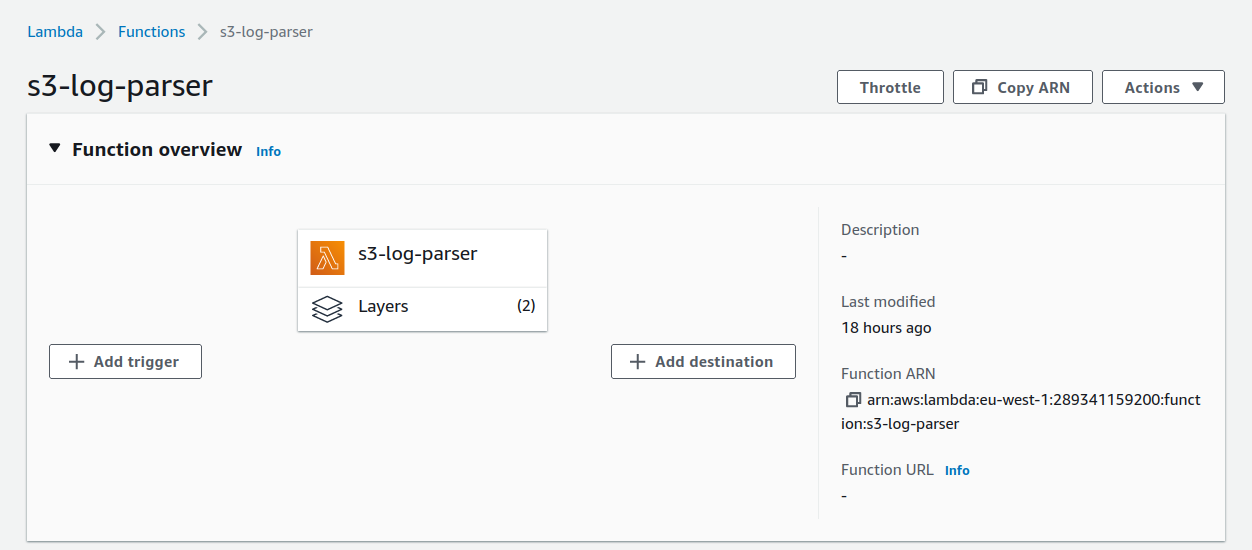
If we click on the "Layers" icon and then Edit, we can see that our function is currently using two layers: the blambda runtime and the deps layer:
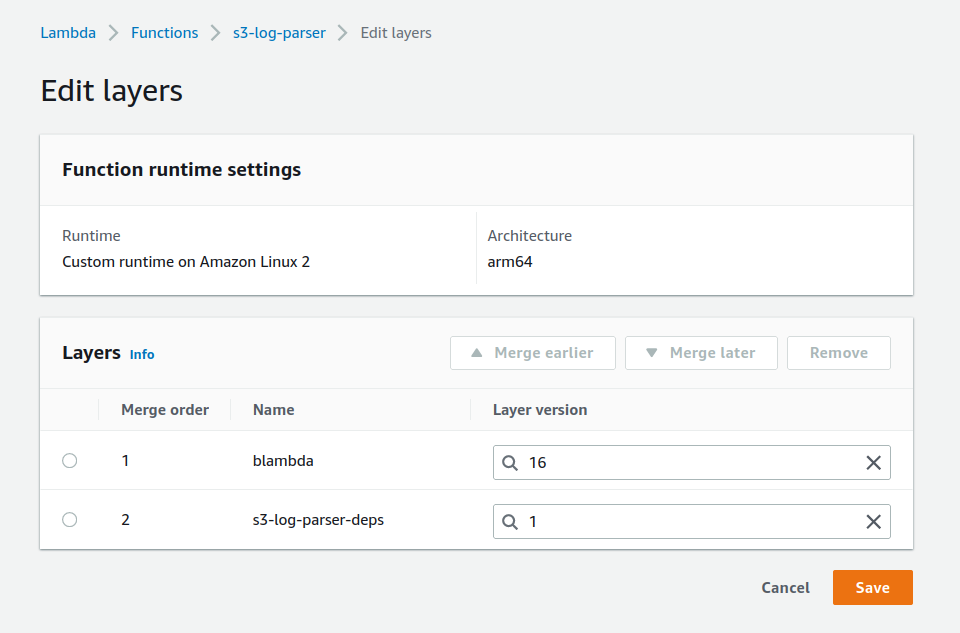
We need to change the version of the s3-log-parser-deps to 2 and then click Save.
Now that our deps are updated, let's set the environment variables. If we click on the Configuration tab just under the function overview, we see Environment variables on the left hand side. Clicking that reveals that we have no environment variables currently set:
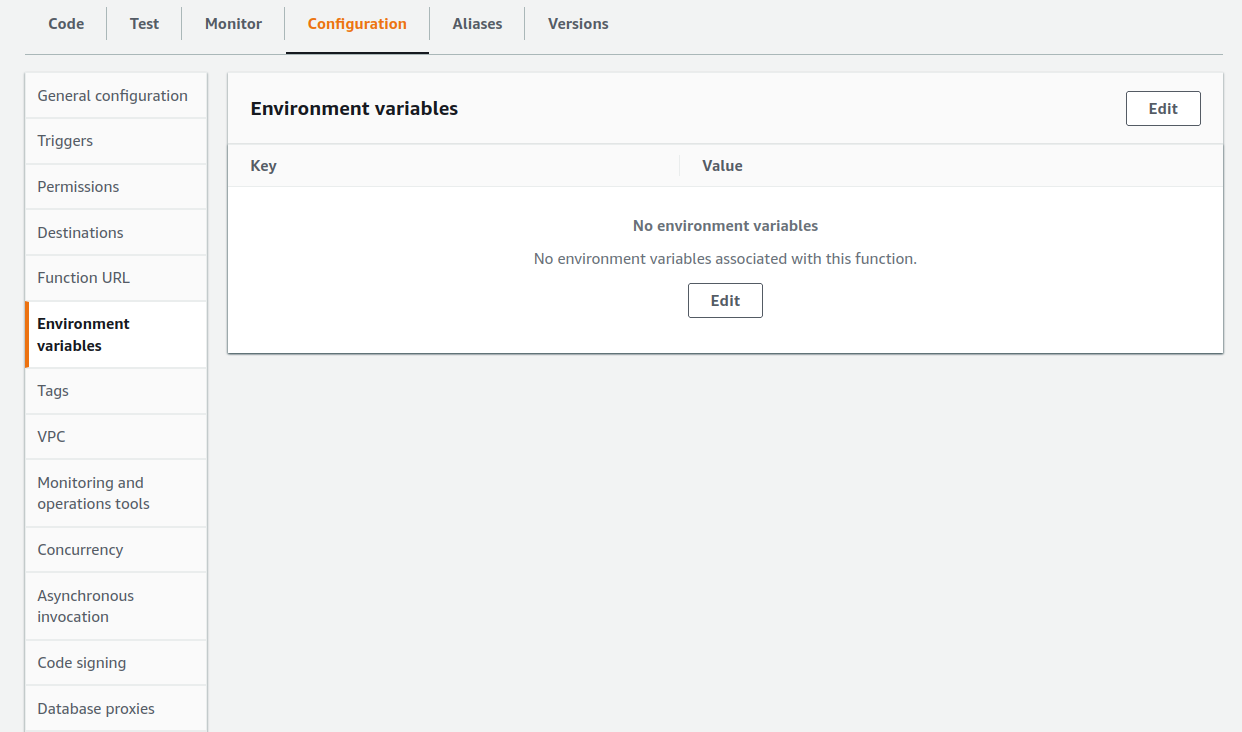
Let's click the Edit button and add the S3_BUCKET and S3_PREFIX environment variables (AWS_REGION is set by the Lambda instance itself, so we don't need to set it):
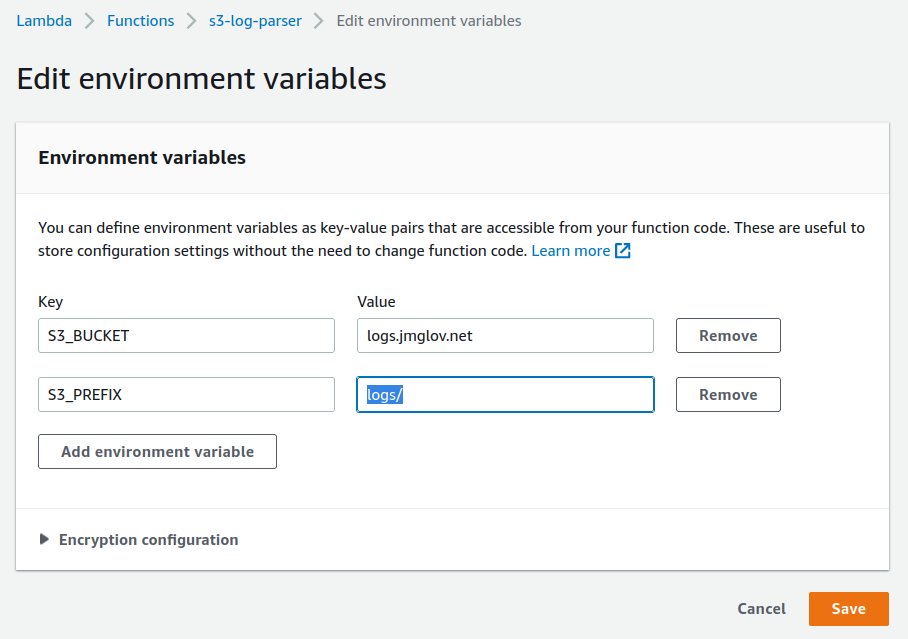
And now it's time for the code itself. Let's click on the Code tab, then just copy and paste the contents of our editor's code buffer over top of the code in s3_log_parser.clj:
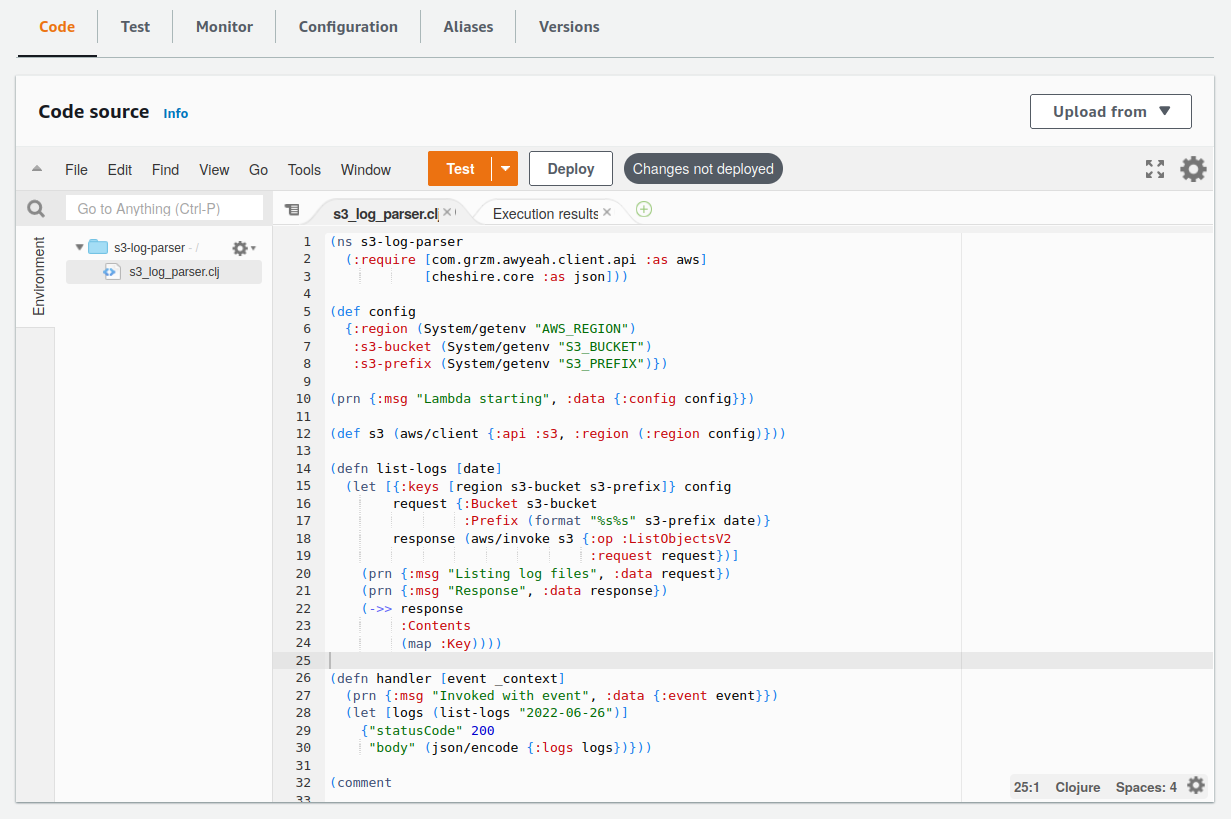
The really cool thing about Rich comments is that we don't need to remove them from our source code, since they're not evaluated when loading the namespace!
Now we click Deploy to get the new code out there, and there's only one thing standing between us and glory: configuring a test event. In order to do this, we need to click the dropdown on the Test button, then select **Create new event. We can fill in something like "test" for the Event name**, leave the Event sharing settings to the default of "Private", and then click on the Template dropdown and select "API Gateway AWS Proxy" (since we intend this lambda to be invoked using a function URL, which uses the same input payload as AWS Gateway):
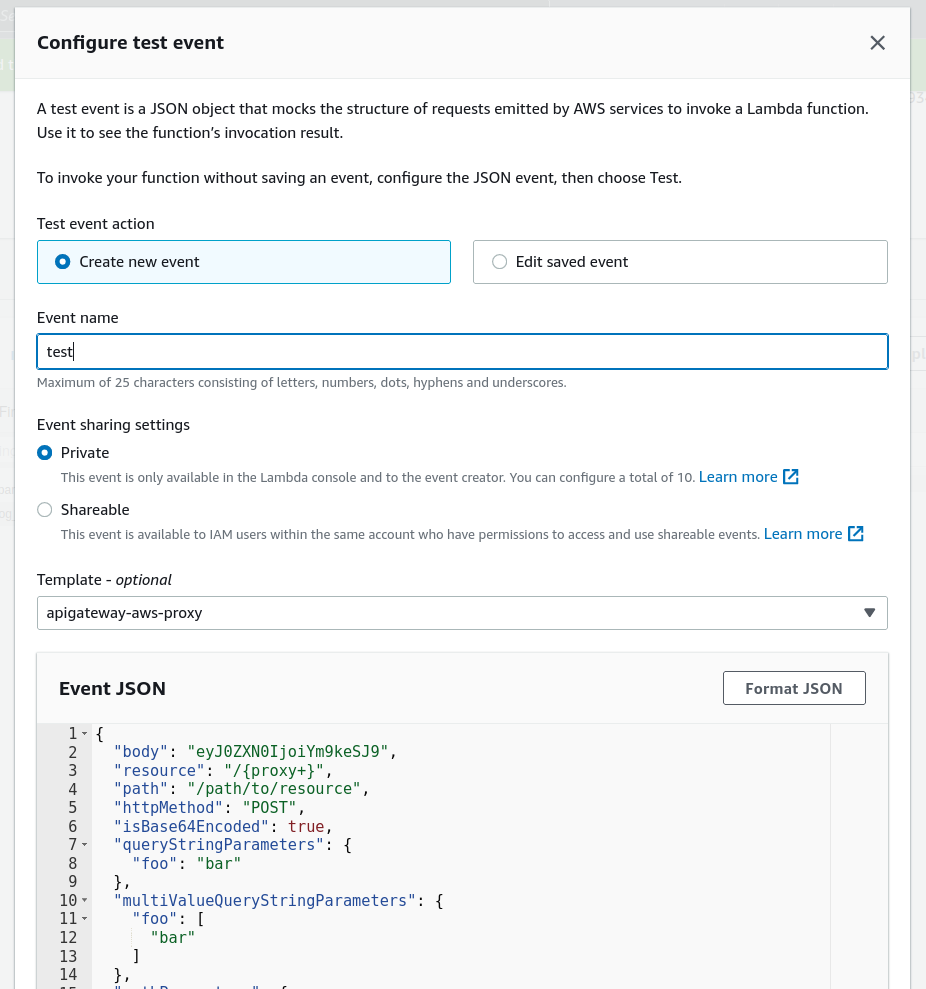
If we scroll down and click Save, we're in business! Now we can click the Test button and revel in our success:
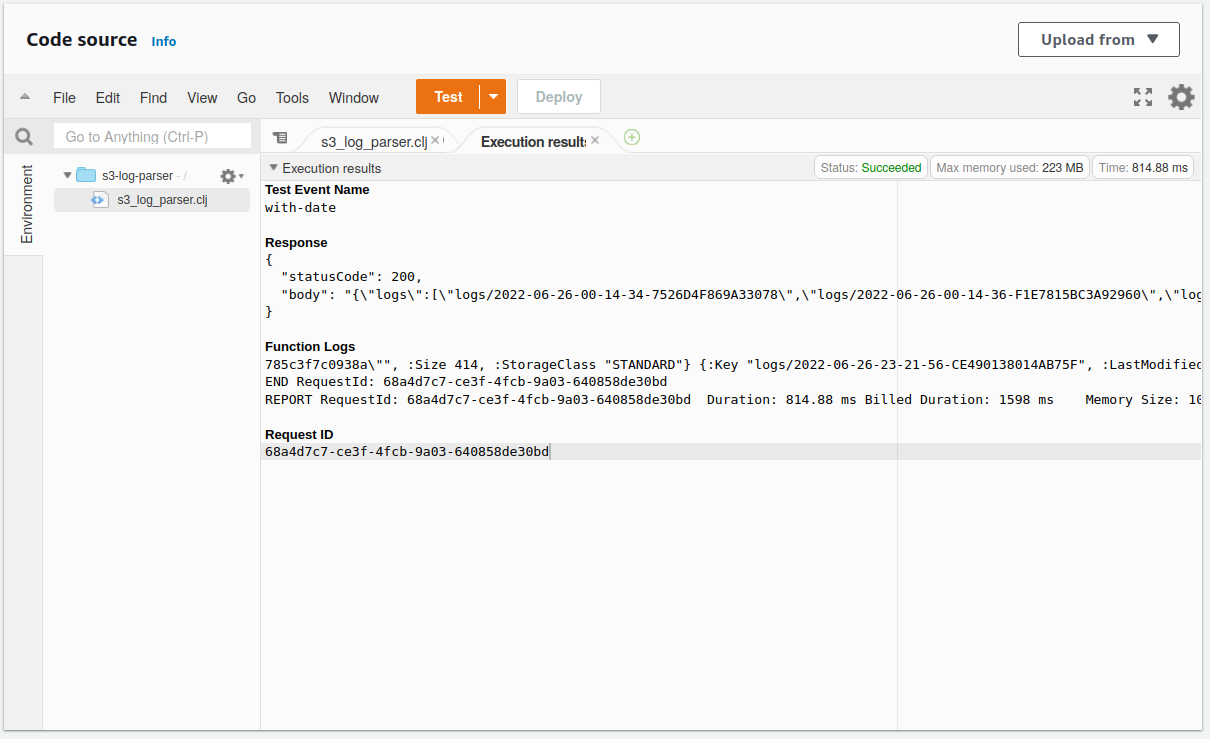
As amazing as all this is, it is a little limiting that our lambda only lists logs for 2022-06-26. How about we accept the date as a query string parameter instead? Looking at the AWS Lambda proxy integration
payload, we can see that the query parameters are exposed in a queryStringParameters object in the event. Let's grab that and use it as the date parameter to list-logs:
(defn handler [event _context]
(prn {:msg "Invoked with event", :data {:event event}})
(let [date (get-in event ["queryStringParameters" "date"])
logs (list-logs date)]
{"statusCode" 200
"body" (json/encode {:logs logs})}))
(comment
(def event {"queryStringParameters" {"date" "2022-09-02"}})
;; => #<Var@4262c861: {"queryStringParameters" {"date" "2022-09-02"}}>
(handler event {})
;; => {"statusCode" 200,
;; "body"
;; "{\"logs\":[\"logs/2022-09-02-00-12-42-F789B0CC4E3D8814\",\"logs/2022-09-02-00-13-14-534A4D7BB857B5D3\"]}"}
)
This whole (prn {:msg ...}) thing is getting a bit tiring, so let's add a log function instead. We might as well also add the timestamp to the log message whilst we're at it:
(ns s3-log-parser
(:require [cheshire.core :as json]
[com.grzm.awyeah.client.api :as aws])
(:import (java.time Instant)))
(defn log [msg data]
(prn {:msg msg
:data data
:timestamp (str (Instant/now))}))
OK, this is moving in the right direction, but what if someone sends in the date in the wrong format?
(comment
(handler {"queryStringParameters" {"date" "2/9/2022"}} {})
;; => {"statusCode" 200, "body" "{\"logs\":[]}"}
)
I mean, this is technically correct, but it would be much more friendly to actually let the caller know that they did something wrong. Let's parse the date to be sure it's valid before handing it off to list-logs:
(ns s3-log-parser
(:require [cheshire.core :as json]
[com.grzm.awyeah.client.api :as aws])
(:import (java.time Instant
LocalDate)))
(defn get-date [date-str]
(try
(LocalDate/parse date-str)
(catch Exception _
(let [msg (format "Invalid date: %s" date-str)
data {:date date-str}]
(log msg data)
(throw (ex-info msg data))))))
(comment
(get-date "2/9/2022")
;; => : Invalid date: 2/9/2022 s3-log-parser
)
Cool. There's another annoyance here, though: we're logging the error and then throwing an exception with the exact same data. Let's create a function to do this for us, and then we can be more concise in get-date:
(defn error [msg data]
(log msg data)
(throw (ex-info msg data)))
(defn get-date [date-str]
(try
(LocalDate/parse date-str)
(catch Exception _
(error (format "Invalid date: %s" date-str) {:date date-str}))))
(comment
(get-date "2022-06-28")
;; => #object[java.time.LocalDate 0x502a28d3 "2022-06-28"]
(get-date "2/9/2022")
;; => : Invalid date: nope s3-log-parser
)
If we think a little about our API, it seems probable that someone could call it without providing a date parameter, in which case it seems reasonable to get today's logs. Let's update get-date accordingly:
(defn get-date [date-str]
(if date-str
(try
(LocalDate/parse date-str)
(catch Exception _
(error (format "Invalid date: %s" date-str) {:date date-str})))
(LocalDate/now)))
(comment
(get-date nil)
;; => #object[java.time.LocalDate 0x1b2b5155 "2022-09-02"]
)
Now that get-date can throw an exception, we should handle that by returning a 400:
(defn handler [event _context]
(log "Invoked with event" {:event event})
(try
(let [date (get-date (get-in event ["queryStringParameters" "date"]))
logs (list-logs date)]
{"statusCode" 200
"body" (json/encode {:logs logs})})
(catch Exception e
(log (ex-message e) (ex-data e))
{"statusCode" 400
"body" (ex-message e)}))))
(comment
(handler {"queryStringParameters" {"date" "2022-06-28"}} {})
;; => {"statusCode" 200,
;; "body"
;; "{\"logs\":[\"logs/2022-06-28-00-12-36-5E32B8C5369C818E\",\"logs/2022-06-28-00-15-28-989878A1E585B6F5\"]}"}
(handler {} {})
;; => {"statusCode" 200,
;; "body"
;; "{\"logs\":[\"logs/2022-09-01-00-12-48-36034402F760D842\",\"logs/2022-09-01-00-13-47-48D19FF5B34710F9\"]}"}
)
Alright, we now have a lambda that can list logs. However, that's not really what we set out to do; we actually wanted to parse the logs and return the data contained therein. Of course, a necessary precursor to parsing the logs is actually retrieving them from S3. Looking at the S3 API documentation, the GetObject operation looks promising. Let's try it out!
(comment
(aws/invoke s3 {:op :GetObject
:request {:Bucket (:s3-bucket config)
:Key "logs/2022-06-28-00-15-28-989878A1E585B6F5"}})
;; => {:LastModified #inst "2022-06-28T00:15:29.000-00:00",
;; :ETag "\"59877f6538514fe39b6874d9220c10a6\"",
;; :Metadata {},
;; :ServerSideEncryption "AES256",
;; :ContentLength 379,
;; :ContentType "text/plain",
;; :AcceptRanges "bytes",
;; :Body
;; #object[java.io.BufferedInputStream 0x61636398 "java.io.BufferedInputStream@61636398"]}
)
OK, so GetObject returns the contents of the object as a BufferedInputStream. In order to do something reasonable with that, we need to wrap it in some sort of reader, which we can do with clojure.java.io/reader:
(ns s3-log-parser
(:require [clojure.java.io :as io]
[cheshire.core :as json]
[com.grzm.awyeah.client.api :as aws])
(:import (java.time Instant
LocalDate)))
(comment
(->> (aws/invoke s3 {:op :GetObject
:request {:Bucket (:s3-bucket config)
:Key "logs/2022-06-28-00-15-28-989878A1E585B6F5"}})
:Body
io/reader)
;; => #object[java.io.BufferedReader 0x7aac737b "java.io.BufferedReader@7aac737b"]
(->> (aws/invoke s3 {:op :GetObject
:request {:Bucket (:s3-bucket config)
:Key "logs/2022-06-28-00-15-28-989878A1E585B6F5"}})
:Body
io/reader
slurp)
;; => "022d83ad6361dec3c93757e75c1c3a7982532ffdbf3bf87976490873591e2188 jmglov.net [27/Jun/2022:23:44:08 +0000] 64.252.68.192 - DC5849267MERJ0J5 WEBSITE.GET.OBJECT blog/atom.xml \"GET /blog/atom.xml HTTP/1.1\" 304 - - 87380 25 - \"-\" \"Amazon CloudFront\" - xm6O1t0x9H8Opu44YrFM/PxX/SUFizd4pS1/FJ/oJqdywpkzcmqx/N7Kv2eMF1Ij+32rM17h/HQ= - - - jmglov.net.s3-website-eu-west-1.amazonaws.com - -\n"
)
Reading the contents into a string with slurp is cool, but it would be nicer if we can get a sequence of lines. There's a helpful function in clojure.core called line-seq, which does just that. Even better, it can also consume from a reader!
(comment
(->> (aws/invoke s3 {:op :GetObject
:request {:Bucket (:s3-bucket config)
:Key "logs/2022-06-28-00-15-28-989878A1E585B6F5"}})
:Body
io/reader
line-seq)
;; => ("022d83ad6361dec3c93757e75c1c3a7982532ffdbf3bf87976490873591e2188 jmglov.net [27/Jun/2022:23:44:08 +0000] 64.252.68.192 - DC5849267MERJ0J5 WEBSITE.GET.OBJECT blog/atom.xml \"GET /blog/atom.xml HTTP/1.1\" 304 - - 87380 25 - \"-\" \"Amazon CloudFront\" - xm6O1t0x9H8Opu44YrFM/PxX/SUFizd4pS1/FJ/oJqdywpkzcmqx/N7Kv2eMF1Ij+32rM17h/HQ= - - - jmglov.net.s3-website-eu-west-1.amazonaws.com - -")
)
Now that we've learned how to grab lines from a log, let's put it in a function:
(defn get-log-lines [s3-key]
(->> (aws/invoke s3 {:op :GetObject
:request {:Bucket (:s3-bucket config)
:Key s3-key}})
:Body
io/reader
line-seq))
(comment
(get-log-lines "logs/2022-06-28-00-15-28-989878A1E585B6F5")
;; => ("022d83ad6361dec3c93757e75c1c3a7982532ffdbf3bf87976490873591e2188 jmglov.net [27/Jun/2022:23:44:08 +0000] 64.252.68.192 - DC5849267MERJ0J5 WEBSITE.GET.OBJECT blog/atom.xml \"GET /blog/atom.xml HTTP/1.1\" 304 - - 87380 25 - \"-\" \"Amazon CloudFront\" - xm6O1t0x9H8Opu44YrFM/PxX/SUFizd4pS1/FJ/oJqdywpkzcmqx/N7Kv2eMF1Ij+32rM17h/HQ= - - - jmglov.net.s3-website-eu-west-1.amazonaws.com - -")
)
Now we can glue together what we've done so far to get all the log lines for a specific date!
(comment
(->> (list-logs "2022-06-28")
(mapcat get-log-lines))
;; => ("022d83ad6361dec3c93757e75c1c3a7982532ffdbf3bf87976490873591e2188 jmglov.net [27/Jun/2022:23:30:23 +0000] 64.252.88.38 - DA5918VPJFK9A654 WEBSITE.GET.OBJECT blog/2022-06-21-todo-list.html \"GET /blog/2022-06-21-todo-list.html HTTP/1.1\" 304 - - 5447 32 - \"-\" \"Amazon CloudFront\" - ukDRnMomesiUakfwW1nSFaoxoQQ/Nn14Dv+4helmPEcIkaIxEFfPojLviLC9vdbiER5zyB/ZOxI= - - - jmglov.net.s3-website-eu-west-1.amazonaws.com - -"
;; "022d83ad6361dec3c93757e75c1c3a7982532ffdbf3bf87976490873591e2188 jmglov.net [27/Jun/2022:23:44:08 +0000] 64.252.68.192 - DC5849267MERJ0J5 WEBSITE.GET.OBJECT blog/atom.xml \"GET /blog/atom.xml HTTP/1.1\" 304 - - 87380 25 - \"-\" \"Amazon CloudFront\" - xm6O1t0x9H8Opu44YrFM/PxX/SUFizd4pS1/FJ/oJqdywpkzcmqx/N7Kv2eMF1Ij+32rM17h/HQ= - - - jmglov.net.s3-website-eu-west-1.amazonaws.com - -")
)
Now we're getting somewhere!
Of course, we haven't taken into account the fact that calls to S3 can fail, and of course anything that can fail will eventually fail. Let's see what happens if we feed GetObject a key that doesn't exist:
(comment
(aws/invoke s3 {:op :GetObject
:request {:Bucket (:s3-bucket config)
:Key "NOPE!"}})
;; => {:Error
;; {:HostIdAttrs {},
;; :KeyAttrs {},
;; :Message "The specified key does not exist.",
;; :Key "NOPE!",
;; :CodeAttrs {},
;; :RequestIdAttrs {},
;; :HostId
;; "Qfz+CzbvxySHBLdd1vIfX8rd8dpkgl1fnlxLTWSHGdtt77jqh/n9EJNzHiqKhZeqqMWP+ZUMRBQ=",
;; :MessageAttrs {},
;; :RequestId "0TESGW38EP6NQ6XK",
;; :Code "NoSuchKey"},
;; :ErrorAttrs {},
;; :cognitect.anomalies/category :cognitect.anomalies/not-found}
)
OK, this is straightforward enough to handle. We'll just check for an :Error key in the response and call our error function to log and throw:
(defn get-log-lines [s3-key]
(let [resp (aws/invoke s3 {:op :GetObject
:request {:Bucket (:s3-bucket config)
:Key s3-key}})]
(if (:Error resp)
(error (-> resp :Error :Message) (:Error resp))
(->> resp
:Body
io/reader
line-seq))))
(comment
(get-log-lines "NOPE!")
;; => : The specified key does not exist. s3-log-parser
)
It is a little distracting to have this if / else conditional in the middle of our otherwise pristine get-log-lines function, however. Let's pull error handling out into a separate function:
(defn handle-error [{err :Error :as resp}]
(if err
(error (:Message err) err)
resp))
(comment
(handle-error
{:Error
{:HostIdAttrs {},
:KeyAttrs {},
:Message "The specified key does not exist.",
:Key "NOPE!",
:CodeAttrs {},
:RequestIdAttrs {},
:HostId
"Qfz+CzbvxySHBLdd1vIfX8rd8dpkgl1fnlxLTWSHGdtt77jqh/n9EJNzHiqKhZeqqMWP+ZUMRBQ=",
:MessageAttrs {},
:RequestId "0TESGW38EP6NQ6XK",
:Code "NoSuchKey"},
:ErrorAttrs {},
:cognitect.anomalies/category :cognitect.anomalies/not-found})
;; => : The specified key does not exist. s3-log-parser
(handle-error {:foo 1})
;; => {:foo 1}
)
Now we can keep get-log-lines focused on the happy path:
(defn get-log-lines [s3-key]
(->> (aws/invoke s3 {:op :GetObject
:request {:Bucket (:s3-bucket config)
:Key s3-key}})
handle-error
:Body
io/reader
line-seq))
We now have what we need to read logs, so let's update the handler to do just that:
(defn handler [event _context]
(log "Invoked with event" {:event event})
(try
(let [date (get-date (get-in event ["queryStringParameters" "date"]))
logs (list-logs date)
log-lines (mapcat get-log-lines logs)]
{"statusCode" 200
"body" (json/encode {:logs logs
:lines log-lines})})
(catch Exception e
(log (ex-message e) (ex-data e))
{"statusCode" 400
"body" (ex-message e)}))))
(comment
(handler {} {})
;; => {"statusCode" 200,
;; "body"
;; "{\"logs\":[\"logs/2022-09-01-00-12-48-36034402F760D842\",\"logs/2022-09-01-00-13-47-48D19FF5B34710F9\"],\"lines\":[\"022d83ad6361dec3c93757e75c1c3a7982532ffdbf3bf87976490873591e2188 jmglov.net [31/Aug/2022:23:40:32 +0000] 64.252.89.133 - BC0KZGTDKR1QP07G WEBSITE.HEAD.OBJECT blog/2022-08-26-doing-software-wrong.html \\\"HEAD /blog/2022-08-26-doing-software-wrong.html HTTP/1.1\\\" 304 - - 7536 34 - \\\"-\\\" \\\"Amazon CloudFront\\\" - ApxkRhuJl/C73ZiR70xT6Stn2b1RkIcDPMnapeH5kWWQ+mT41qXfNeLaqpMc3j+5WCnrqoJH8N0= - - - jmglov.net.s3-website-eu-west-1.amazonaws.com - -\",\"022d83ad6361dec3c93757e75c1c3a7982532ffdbf3bf87976490873591e2188 jmglov.net [31/Aug/2022:23:14:14 +0000] 64.252.73.234 - M987YV3YB7DHBWA3 WEBSITE.GET.OBJECT index.html \\\"GET / HTTP/1.1\\\" 304 - - 3459 18 - \\\"-\\\" \\\"Amazon CloudFront\\\" - 14MYY/WyblbL1WgULsK86Cwwtn+tHCOgs+Y98xIkC/EIwkqMeN/SWpBsF6x2gC1Tir7DYRc/+Zk= - - - jmglov.net.s3-website-eu-west-1.amazonaws.com - -\"]}"}
)
It's neat to be able to test the handler in the REPL, but it is a little annoying to have to always invoke it like (handler {} {}) if we just want an empty event. Let's use Clojure's multi-arity functions to define a handler/0 and a handler/1 (the way you reference functions of different arities in Erlang is simply the best; read handler/0 as "a function handler taking 0 arguments", and handler/1 as "a function handler taking 1 argument").
(defn handler
([]
(handler {} {}))
([event]
(handler event {}))
([event _context]
(log "Invoked with event" {:event event})
(try
(let [date (get-date (get-in event ["queryStringParameters" "date"]))
logs (list-logs date)
log-lines (mapcat get-log-lines logs)]
{"statusCode" 200
"body" (json/encode {:logs logs
:lines log-lines})})
(catch Exception e
(log (ex-message e) (ex-data e))
{"statusCode" 400
"body" (ex-message e)}))))
(comment
(handler)
;; => {"statusCode" 200,
;; "body"
;; "{\"logs\":[\"logs/2022-09-01-00-12-48-36034402F760D842\",\"logs/2022-09-01-00-13-47-48D19FF5B34710F9\"],\"lines\":[\"022d83ad6361dec3c93757e75c1c3a7982532ffdbf3bf87976490873591e2188 jmglov.net [31/Aug/2022:23:40:32 +0000] 64.252.89.133 - BC0KZGTDKR1QP07G WEBSITE.HEAD.OBJECT blog/2022-08-26-doing-software-wrong.html \\\"HEAD /blog/2022-08-26-doing-software-wrong.html HTTP/1.1\\\" 304 - - 7536 34 - \\\"-\\\" \\\"Amazon CloudFront\\\" - ApxkRhuJl/C73ZiR70xT6Stn2b1RkIcDPMnapeH5kWWQ+mT41qXfNeLaqpMc3j+5WCnrqoJH8N0= - - - jmglov.net.s3-website-eu-west-1.amazonaws.com - -\",\"022d83ad6361dec3c93757e75c1c3a7982532ffdbf3bf87976490873591e2188 jmglov.net [31/Aug/2022:23:14:14 +0000] 64.252.73.234 - M987YV3YB7DHBWA3 WEBSITE.GET.OBJECT index.html \\\"GET / HTTP/1.1\\\" 304 - - 3459 18 - \\\"-\\\" \\\"Amazon CloudFront\\\" - 14MYY/WyblbL1WgULsK86Cwwtn+tHCOgs+Y98xIkC/EIwkqMeN/SWpBsF6x2gC1Tir7DYRc/+Zk= - - - jmglov.net.s3-website-eu-west-1.amazonaws.com - -\"]}"}
)
OK, we now have something worth pasting into the Lambda console and testing out!
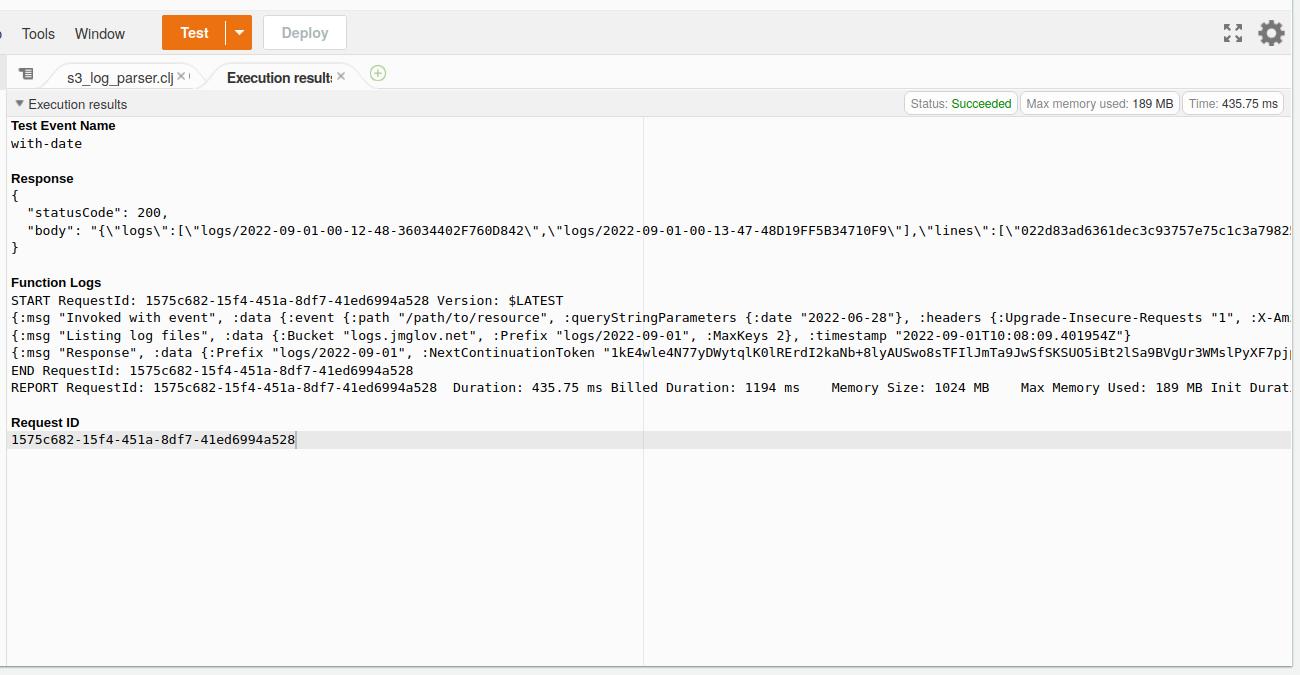
There's one final thing to do: actually parse the log lines. If we take a look at the Amazon S3 server access log format documentation, we can see how we need to parse this thing. And for parsing strings, the obvious place to turn is a regular expression!
(comment
(re-seq #"^(\S+) (\S+) \[([^]]+)\] (\S+) (\S+) (\S+) (\S+) (\S+) \"([^\"]+)\" (\S+) (\S+) (\S+) (\S+) (\S+) (\S+) \"([^\"]+)\" \"([^\"]+)\" (\S+) (\S+) (\S+) (\S+) (\S+) (\S+) (\S+) (\S+).*$"
"022d83ad6361dec3c93757e75c1c3a7982532ffdbf3bf87976490873591e2188 jmglov.net [27/Jun/2022:23:30:23 +0000] 64.252.88.38 - DA5918VPJFK9A654 WEBSITE.GET.OBJECT blog/2022-06-21-todo-list.html \"GET /blog/2022-06-21-todo-list.html HTTP/1.1\" 304 - - 5447 32 - \"-\" \"Amazon CloudFront\" - ukDRnMomesiUakfwW1nSFaoxoQQ/Nn14Dv+4helmPEcIkaIxEFfPojLviLC9vdbiER5zyB/ZOxI= - - - jmglov.net.s3-website-eu-west-1.amazonaws.com - -")
;; => (["022d83ad6361dec3c93757e75c1c3a7982532ffdbf3bf87976490873591e2188 jmglov.net [27/Jun/2022:23:30:23 +0000] 64.252.88.38 - DA5918VPJFK9A654 WEBSITE.GET.OBJECT blog/2022-06-21-todo-list.html \"GET /blog/2022-06-21-todo-list.html HTTP/1.1\" 304 - - 5447 32 - \"-\" \"Amazon CloudFront\" - ukDRnMomesiUakfwW1nSFaoxoQQ/Nn14Dv+4helmPEcIkaIxEFfPojLviLC9vdbiER5zyB/ZOxI= - - - jmglov.net.s3-website-eu-west-1.amazonaws.com - -"
;; "022d83ad6361dec3c93757e75c1c3a7982532ffdbf3bf87976490873591e2188"
;; "jmglov.net"
;; "27/Jun/2022:23:30:23 +0000"
;; "64.252.88.38"
;; "-"
;; "DA5918VPJFK9A654"
;; "WEBSITE.GET.OBJECT"
;; "blog/2022-06-21-todo-list.html"
;; "GET /blog/2022-06-21-todo-list.html HTTP/1.1"
;; "304"
;; "-"
;; "-"
;; "5447"
;; "32"
;; "-"
;; "-"
;; "Amazon CloudFront"
;; "-"
;; "ukDRnMomesiUakfwW1nSFaoxoQQ/Nn14Dv+4helmPEcIkaIxEFfPojLviLC9vdbiER5zyB/ZOxI="
;; "-"
;; "-"
;; "-"
;; "jmglov.net.s3-website-eu-west-1.amazonaws.com"
;; "-"
;; "-"])
)
Amazing! But also not amazing. Regular expressions get a bad name for being cryptic and brittle, so let's see if we can use the power of Clojure to make this one accessible and resilient!
We can define a variable that holds both the name of the field and the pattern used to match it:
(ns s3-log-parser
(:require [clojure.java.io :as io]
[clojure.string :as str]
[cheshire.core :as json]
[com.grzm.awyeah.client.api :as aws])
(:import (java.time Instant
LocalDate)))
(comment
(def log-fields
(->> [:bucket-owner "(\\S+)"
:bucket "(\\S+)"
:time "\\[([^]]+)\\]"
:remote-ip "(\\S+)"
:requester "(\\S+)"
:request-id "(\\S+)"
:operation "(\\S+)"
:key "(\\S+)"
:request-uri "\"([^\"]+)\""
:http-status "(\\S+)"
:error-code "(\\S+)"
:bytes-sent "(\\S+)"
:object-size "(\\S+)"
:total-time "(\\S+)"
:turn-around-time "(\\S+)"
:referer "\"([^\"]+)\""
:user-agent "\"([^\"]+)\""
:version-id "(\\S+)"
:host-id "(\\S+)"
:signature-version "(\\S+)"
:cipher-suite "(\\S+)"
:authentication-type "(\\S+)"
:host-header "(\\S+)"
:tls-version "(\\S+)"
:access-point-arn "(\\S+)"]
(partition-all 2)))
;; => #<Var@4b3cc742:
;; ((:bucket-owner "(\\S+)")
;; (:bucket "(\\S+)")
;; (:time "\\[([^]]+)\\]")
;; (:remote-ip "(\\S+)")
;; (:requester "(\\S+)")
;; (:request-id "(\\S+)")
;; (:operation "(\\S+)")
;; (:key "(\\S+)")
;; (:request-uri "\"([^\"]+)\"")
;; (:http-status "(\\S+)")
;; (:error-code "(\\S+)")
;; (:bytes-sent "(\\S+)")
;; (:object-size "(\\S+)")
;; (:total-time "(\\S+)")
;; (:turn-around-time "(\\S+)")
;; (:referer "\"([^\"]+)\"")
;; (:user-agent "\"([^\"]+)\"")
;; (:version-id "(\\S+)")
;; (:host-id "(\\S+)")
;; (:signature-version "(\\S+)")
;; (:cipher-suite "(\\S+)")
;; (:authentication-type "(\\S+)")
;; (:host-header "(\\S+)")
;; (:tls-version "(\\S+)")
;; (:access-point-arn "(\\S+)"))>
)
Having done this, let's build the regex from the individual patterns:
(comment
(def log-regex (->> log-fields
(map second)
(str/join " ")
(format "^%s(.*)$")
re-pattern))
;; => #<Var@487539b9:
;; #"^(\S+) (\S+) \[([^]]+)\] (\S+) (\S+) (\S+) (\S+) (\S+) \"([^\"]+)\" (\S+) (\S+) (\S+) (\S+) (\S+) (\S+) \"([^\"]+)\" \"([^\"]+)\" (\S+) (\S+) (\S+) (\S+) (\S+) (\S+) (\S+) (\S+)(.*)$">
(re-seq log-regex
"022d83ad6361dec3c93757e75c1c3a7982532ffdbf3bf87976490873591e2188 jmglov.net [27/Jun/2022:23:30:23 +0000] 64.252.88.38 - DA5918VPJFK9A654 WEBSITE.GET.OBJECT blog/2022-06-21-todo-list.html \"GET /blog/2022-06-21-todo-list.html HTTP/1.1\" 304 - - 5447 32 - \"-\" \"Amazon CloudFront\" - ukDRnMomesiUakfwW1nSFaoxoQQ/Nn14Dv+4helmPEcIkaIxEFfPojLviLC9vdbiER5zyB/ZOxI= - - - jmglov.net.s3-website-eu-west-1.amazonaws.com - -")
;; => (["022d83ad6361dec3c93757e75c1c3a7982532ffdbf3bf87976490873591e2188 jmglov.net [27/Jun/2022:23:30:23 +0000] 64.252.88.38 - DA5918VPJFK9A654 WEBSITE.GET.OBJECT blog/2022-06-21-todo-list.html \"GET /blog/2022-06-21-todo-list.html HTTP/1.1\" 304 - - 5447 32 - \"-\" \"Amazon CloudFront\" - ukDRnMomesiUakfwW1nSFaoxoQQ/Nn14Dv+4helmPEcIkaIxEFfPojLviLC9vdbiER5zyB/ZOxI= - - - jmglov.net.s3-website-eu-west-1.amazonaws.com - -"
;; "022d83ad6361dec3c93757e75c1c3a7982532ffdbf3bf87976490873591e2188"
;; "jmglov.net"
;; "27/Jun/2022:23:30:23 +0000"
;; "64.252.88.38"
;; "-"
;; "DA5918VPJFK9A654"
;; "WEBSITE.GET.OBJECT"
;; "blog/2022-06-21-todo-list.html"
;; "GET /blog/2022-06-21-todo-list.html HTTP/1.1"
;; "304"
;; "-"
;; "-"
;; "5447"
;; "32"
;; "-"
;; "-"
;; "Amazon CloudFront"
;; "-"
;; "ukDRnMomesiUakfwW1nSFaoxoQQ/Nn14Dv+4helmPEcIkaIxEFfPojLviLC9vdbiER5zyB/ZOxI="
;; "-"
;; "-"
;; "-"
;; "jmglov.net.s3-website-eu-west-1.amazonaws.com"
;; "-"
;; "-"
;; ""])
)
Now we can grab the names of the fields and build a map by zipping them together with the matched groups from the regex:
(comment
(def log-keys (map first log-fields))
;; => #<Var@abab7a:
;; (:bucket-owner
;; :bucket
;; :time
;; :remote-ip
;; :requester
;; :request-id
;; :operation
;; :key
;; :request-uri
;; :http-status
;; :error-code
;; :bytes-sent
;; :object-size
;; :total-time
;; :turn-around-time
;; :referer
;; :user-agent
;; :version-id
;; :host-id
;; :signature-version
;; :cipher-suite
;; :authentication-type
;; :host-header
;; :tls-version
;; :access-point-arn)>
(->> "022d83ad6361dec3c93757e75c1c3a7982532ffdbf3bf87976490873591e2188 jmglov.net [27/Jun/2022:23:30:23 +0000] 64.252.88.38 - DA5918VPJFK9A654 WEBSITE.GET.OBJECT blog/2022-06-21-todo-list.html \"GET /blog/2022-06-21-todo-list.html HTTP/1.1\" 304 - - 5447 32 - \"-\" \"Amazon CloudFront\" - ukDRnMomesiUakfwW1nSFaoxoQQ/Nn14Dv+4helmPEcIkaIxEFfPojLviLC9vdbiER5zyB/ZOxI= - - - jmglov.net.s3-website-eu-west-1.amazonaws.com - -"
(re-seq log-regex)
first
(drop 1)
(zipmap log-keys))
;; => {:tls-version "-",
;; :request-uri "GET /blog/2022-06-21-todo-list.html HTTP/1.1",
;; :access-point-arn "-",
;; :request-id "DA5918VPJFK9A654",
;; :referer "-",
;; :user-agent "Amazon CloudFront",
;; :remote-ip "64.252.88.38",
;; :key "blog/2022-06-21-todo-list.html",
;; :host-header "jmglov.net.s3-website-eu-west-1.amazonaws.com",
;; :version-id "-",
;; :time "27/Jun/2022:23:30:23 +0000",
;; :operation "WEBSITE.GET.OBJECT",
;; :object-size "5447",
;; :authentication-type "-",
;; :error-code "-",
;; :bytes-sent "-",
;; :requester "-",
;; :http-status "304",
;; :turn-around-time "-",
;; :signature-version "-",
;; :total-time "32",
;; :host-id
;; "ukDRnMomesiUakfwW1nSFaoxoQQ/Nn14Dv+4helmPEcIkaIxEFfPojLviLC9vdbiER5zyB/ZOxI=",
;; :cipher-suite "-",
;; :bucket "jmglov.net",
;; :bucket-owner
;; "022d83ad6361dec3c93757e75c1c3a7982532ffdbf3bf87976490873591e2188"}
)
There is one slight annoyance here, which is that we have all of these fields with values of "-". According to the docs, a "-" means there's no value for that field, so let's replace this with nil, which is Clojure's way of saying "no value here":
(comment
(->> "022d83ad6361dec3c93757e75c1c3a7982532ffdbf3bf87976490873591e2188 jmglov.net [27/Jun/2022:23:30:23 +0000] 64.252.88.38 - DA5918VPJFK9A654 WEBSITE.GET.OBJECT blog/2022-06-21-todo-list.html \"GET /blog/2022-06-21-todo-list.html HTTP/1.1\" 304 - - 5447 32 - \"-\" \"Amazon CloudFront\" - ukDRnMomesiUakfwW1nSFaoxoQQ/Nn14Dv+4helmPEcIkaIxEFfPojLviLC9vdbiER5zyB/ZOxI= - - - jmglov.net.s3-website-eu-west-1.amazonaws.com - -"
(re-seq log-regex)
first
(drop 1)
(map #(if (= "-" %) nil %))
(zipmap log-keys))
;; => {:tls-version nil,
;; :request-uri "GET /blog/2022-06-21-todo-list.html HTTP/1.1",
;; :access-point-arn nil,
;; :request-id "DA5918VPJFK9A654",
;; :referer nil,
;; :user-agent "Amazon CloudFront",
;; :remote-ip "64.252.88.38",
;; :key "blog/2022-06-21-todo-list.html",
;; :host-header "jmglov.net.s3-website-eu-west-1.amazonaws.com",
;; :version-id nil,
;; :time "27/Jun/2022:23:30:23 +0000",
;; :operation "WEBSITE.GET.OBJECT",
;; :object-size "5447",
;; :authentication-type nil,
;; :error-code nil,
;; :bytes-sent nil,
;; :requester nil,
;; :http-status "304",
;; :turn-around-time nil,
;; :signature-version nil,
;; :total-time "32",
;; :host-id
;; "ukDRnMomesiUakfwW1nSFaoxoQQ/Nn14Dv+4helmPEcIkaIxEFfPojLviLC9vdbiER5zyB/ZOxI=",
;; :cipher-suite nil,
;; :bucket "jmglov.net",
;; :bucket-owner
;; "022d83ad6361dec3c93757e75c1c3a7982532ffdbf3bf87976490873591e2188"}
)
Much nicer!
OK, now that we've written all of this parsing code, we need to put it somewhere, and our name namespace doesn't feel right. Let's create a new file to hold all of the parsing logic, parser.clj:
(ns parser
(:require [clojure.string :as str]))
(def log-fields
(->> [:bucket-owner "(\\S+)"
:bucket "(\\S+)"
:time "\\[([^]]+)\\]"
:remote-ip "(\\S+)"
:requester "(\\S+)"
:request-id "(\\S+)"
:operation "(\\S+)"
:key "(\\S+)"
:request-uri "\"([^\"]+)\""
:http-status "(\\S+)"
:error-code "(\\S+)"
:bytes-sent "(\\S+)"
:object-size "(\\S+)"
:total-time "(\\S+)"
:turn-around-time "(\\S+)"
:referer "\"([^\"]+)\""
:user-agent "\"([^\"]+)\""
:version-id "(\\S+)"
:host-id "(\\S+)"
:signature-version "(\\S+)"
:cipher-suite "(\\S+)"
:authentication-type "(\\S+)"
:host-header "(\\S+)"
:tls-version "(\\S+)"
:access-point-arn "(\\S+)"]
(partition-all 2)))
(def log-keys (map first log-fields))
(def log-regex (->> log-fields
(map second)
(str/join " ")
(format "^%s(.*)$")
re-pattern))
(defn parse-line [log-line]
(->> log-line
(re-seq log-regex)
first
(drop 1)
(map #(if (= "-" %) nil %))
(zipmap log-keys)))
Now we can use this stuff in the handler, back in s3_log_parser.clj:
(ns s3-log-parser
(:require [clojure.java.io :as io]
[cheshire.core :as json]
[com.grzm.awyeah.client.api :as aws]
[parser])
(:import (java.time Instant
LocalDate)))
(defn handler
([]
(handler {} {}))
([event]
(handler event {}))
([event _context]
(log "Invoked with event" {:event event})
(try
(let [date (get-date (get-in event ["queryStringParameters" "date"]))
logs (list-logs date)
log-entries (->> logs
(mapcat get-log-lines)
(map parser/parse-line))
body {:date (str date), :logs logs, :entries log-entries}]
(log "Successfully parsed logs" body)
{"statusCode" 200
"body" (json/encode body)})
(catch Exception e
(log (ex-message e) (ex-data e))
{"statusCode" 400
"body" (ex-message e)}))))
(comment
(handler {})
;; => {"statusCode" 200,
;; "body"
;; "{\"date\":\"2022-09-02\",\"logs\":[\"logs/2022-09-02-00-12-48-36034402F760D842\",\"logs/2022-09-02-00-13-47-48D19FF5B34710F9\"],\"entries\":[{\"request-uri\":\"HEAD /blog/2022-08-26-doing-software-wrong.html HTTP/1.1\",\"request-id\":\"BC0KZGTDKR1QP07G\",\"user-agent\":\"Amazon CloudFront\",\"remote-ip\":\"64.252.89.133\",\"key\":\"blog/2022-08-26-doing-software-wrong.html\",\"host-header\":\"jmglov.net.s3-website-eu-west-1.amazonaws.com\",\"time\":\"31/Aug/2022:23:40:32 +0000\",\"operation\":\"WEBSITE.HEAD.OBJECT\",\"object-size\":\"7536\",\"http-status\":\"304\",\"total-time\":\"34\",\"host-id\":\"ApxkRhuJl/C73ZiR70xT6Stn2b1RkIcDPMnapeH5kWWQ+mT41qXfNeLaqpMc3j+5WCnrqoJH8N0=\",\"bucket\":\"jmglov.net\",\"bucket-owner\":\"022d83ad6361dec3c93757e75c1c3a7982532ffdbf3bf87976490873591e2188\"},{\"request-uri\":\"GET / HTTP/1.1\",\"request-id\":\"M987YV3YB7DHBWA3\",\"user-agent\":\"Amazon CloudFront\",\"remote-ip\":\"64.252.73.234\",\"key\":\"index.html\",\"host-header\":\"jmglov.net.s3-website-eu-west-1.amazonaws.com\",\"time\":\"31/Aug/2022:23:14:14 +0000\",\"operation\":\"WEBSITE.GET.OBJECT\",\"object-size\":\"3459\",\"http-status\":\"304\",\"total-time\":\"18\",\"host-id\":\"14MYY/WyblbL1WgULsK86Cwwtn+tHCOgs+Y98xIkC/EIwkqMeN/SWpBsF6x2gC1Tir7DYRc/+Zk=\",\"bucket\":\"jmglov.net\",\"bucket-owner\":\"022d83ad6361dec3c93757e75c1c3a7982532ffdbf3bf87976490873591e2188\"}]}"}
)
Now that everything looks good, we can go back to the Lambda console and try it out. We'll need to add our parser.clj file to the code, which we can do by using the File > New File menu option in the Code source section of the console, pasting in the contents of parser.clj, and then doing **File > Save As...** and entering "parser.clj" as the filename. We now need to paste the contents of s3_log_parser.clj into that file in the console, then press the Deploy button to put the new code out into the world.
Finally, we can take a deep breath, position the mouse cursor over the Test button, close our eyes, and click... victory!
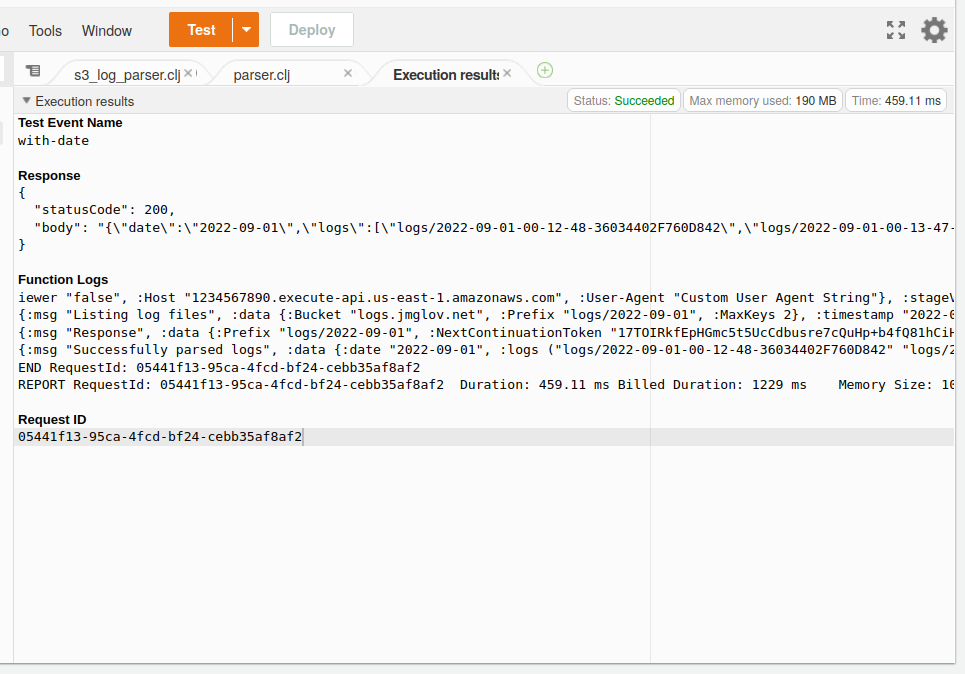
Of course, this is a really clunky and error prone way to deploy code. In the next instalment of Dogfooding Blambda, we'll build a production grade deployment framework.
But for now, let's rest on our laurels so I can go eat some lunch. 😉